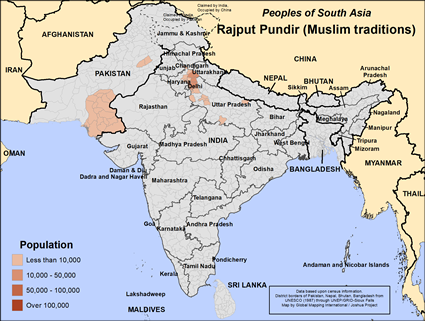Starting in the 5th century, there was a massive attack by the White Huns in what is now northern and northwestern India and Pakistan. About a century later the reigning Hindu-based Gupta Empire broke up, leaving the Subcontinent vulnerable to Muslim invaders from the north. As time went on, invaders took over land and integrated with the settled peoples of this region. Tribal leaders, especially those involved with defense, were accepted as Kshatriya, the second highest varna (major categories of castes) in Hindu society, while their followers became the fourth and lowest varna. Priests became the Brahmins, the highest of the four varnas.
Rajputs, who were part of the Kshatriya varna, became politically important in the seventh century. From around 800 AD Rajput dynasties ruled northern India. Petty Rajput kingdoms were the main obstacle to Muslim domination of the Hindu subcontinent. For hundreds of years Rajputs were the warriors who defended kingdoms from invaders and conquered others. When possible, Rajputs settled down, became nobles, and enjoyed the lives of landed gentry.
Over a period of a couple hundred years, invaders penetrated the Rajput wall that protected the Subcontinent. Some Rajput subgroups converted to Islam during this time. The British Empire put an end to the Moghul Empire, but they recruited Rajputs into their military units. After independence, Indian Prime Minister Indira Gandhi abolished Rajput titles and property rights. The Rajputs have kept alive their proud history of conquest, bravery, and military might.
Rajputs are concentrated in India's northwestern state of Rajasthan, though there are Rajputs all over India. Pakistan also has Rajput communities, mostly in Punjab Province.
Rajputs are divided by three religions: Hinduism, Sikhism and Islam. They are further divided into clans such as the Pundir Rajputs. There are Hindu and Muslim Pundir communities. They are sharply divided along religious communities.
Though many Pundir Rajputs are still in the armed forces or own land, many have moved on to other livelihoods. Some Rajputs now own impressive hotels in Rajasthan where tourists can be introduced to their history and culture. Rajputs who aren't so fortunate work as small businessmen or wage laborers.
They try to marry their daughters into clans of higher rank than their own. The Rajput clans in Rajasthan have the highest status, so families want their daughters to marry men from that state. Unfortunately, Rajputs often marry their daughters off while they are very young.
The Pundir Rajputs can be Hindu or Sunni Muslim. Sunni Muslims like these believe the basic tenets of Islam, but they usually also cling to holdover beliefs from their Hindu past.
Still, it they can, Muslim Pundir Rajputs will make the pilgrimage to Mecca if they have the chance.
Pundir Rajputs are admired in South Asia for their historical and military accomplishments. Rajputs presently are going through something of an identity crisis. They can no longer depend on land ownership or military careers, especially with the Indian government reserving prestigious jobs for underprivileged castes. Believers with the right skills can help them during this time of transition.
Pray for Rajput communities to increasingly grow in awareness of Jesus, and respond to his power and glory.
Pray the Lord will give Pundir Rajput leaders spiritual hunger, then satisfy that hunger with Christ.
Pray these people will understand the value of becoming part of God's royal family.
Pray for Holy Spirit led humility for all Rajput communities to fall at the feet of the King of kings.
Pray for a movement to Christ among every Rajput community.
Pray for Pundir Rajput families to accept the abundant blessings and guidance offered only by Jesus Christ.
Scripture Prayers for the Rajput Pundir (Muslim traditions) in India.
https://en.wikipedia.org/wiki/Category:Rajput_clans
http://induhistory.blogspot.com/p/rajput-history.html
https://www.britannica.com/topic/Rajput
https://en.wikipedia.org/wiki/Rajput
http://allrajputyouthwing.weebly.com/muslim-rajputs-
| Profile Source: Joshua Project |











